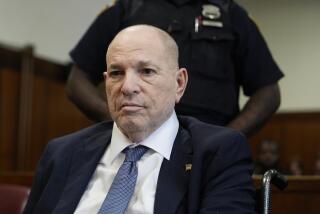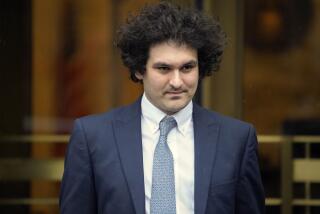Revised Charges Filed Against Keating, 3 Others
- Share via
LOS ANGELES — The Los Angeles district attorney’s office Monday filed an amended and expanded 46-count indictment alleging securities fraud against former Lincoln Savings & Loan owner Charles H. Keating Jr. and three others.
The new charges were submitted to Los Angeles County Superior Court after Judge Lance A. Ito 10 days ago set aside 22 counts of the original 42-count indictment saying they either did not state a criminal offense or were vague.
Deputy Dist. Atty. William Hodgman, who had promised to present a bullet-proof amended indictment, said Monday that the latest version should make it “easier to get a conviction” because a trial court jury would better understand the complicated case.
Hodgman said the new indictment, which has four more counts than the original, won’t expose the defendants to a harsher penalty because conviction on only six counts carries a maximum 10-year prison term. But the new charges do increase the chances for getting those convictions, he said.
Attorneys for Keating and the other defendants--Judy J. Wischer, Ray C. Fidel, and Robin S. Symes--said they would seek dismissal of the amended indictment. They argue that the grand jury and not prosecutors can alter the indictment.
“This is an invasion of the grand jury’s province,” said Donald Smaltz of Los Angeles, attorney for Symes, a former Lincoln president.
Keating is the former chairman of American Continental Corp. in Phoenix, which owned Irvine-based Lincoln. Wischer is former president of American Continental, and Fidel and Symes are both former presidents of Lincoln.
The indictment accuses them of defrauding 17,000 investors, mainly elderly Lincoln depositors, of more than $200 million through the sale of American Continental bonds at the thrift’s 29 branches in Southern California. Many investors said they were misled that the bonds were insured or safe.
The bonds have become worthless since American Continental filed for bankruptcy protection in April, 1989, and regulators seized Lincoln the following day. Lincoln’s collapse is expected to cost U.S. taxpayers more than $2 billion.
Keating’s actions with five U.S. senators are the center of hearings now under way before the Senate Ethics Committee. The senators are being investigated for possible wrongdoing in backing Keating before regulators in exchange for campaign contributions.
He is also subject to numerous civil lawsuits and criminal investigations. Federal regulators are seeking to recover $40.9 million from him stemming from his actions at Lincoln. On Monday, an administrative law judge in Washington denied Keating’s requests to halt proceedings in that matter until other civil and criminal cases are concluded.
In an indictment unsealed Sept. 18, Keating and his co-defendants were charged with securities fraud in the sale of the bonds. But defense attorneys argued at a Nov. 9 hearing that the charges were too vague and should be dismissed.
Ito ruled then that 20 of the 22 counts he set aside simply do not state an offense. Those counts allege that the defendants sold bonds in ways that exceeded the authority given them by the state Department of Corporations, which approved the bond sales. But the law only makes it a violation to sell without authority.
Ito also found that two other charges--accusing the defendants of lying to the Department of Corporations and failing to clear advertising with the agency--did not give Keating and the others any specific idea of what they did wrong.
The judge turned back the defense challenge to the heart of the prosecutors’ case--allegations that the defendants misled investors through false statements or failure to disclose major information.
In 20 counts that were set aside, the prosecution still alleges that Keating and the others sold securities without authority, but it left out the passage alleging they exceeded the authority they had.
Smaltz contends that since American Continental had authority to sell bonds, the defendants didn’t simply violate the state law listed in the indictment.
Prosecutors also turned one count of making false statements to the Department of Corporations into three counts alleging that the defendants lied by failing to provide a prospectus to each customer, paying bonuses to salesmen and allowing Lincoln employees to offer the securities for sale.
The remaining count of failing to file advertising with the state agency also was turned into three counts, each one alleging that the specific newspaper or direct mail advertising was not turned over for agency review before it was published.
Defense attorneys said they would challenge the new indictment, saying only the grand jury can alter the charges.
However, in allowing the indictment’s amendment, Ito cited a state law that allows a district attorney to make minor amendments to an indictment even after the grand jury has been disbanded. Major changes have to be submitted “to the same or another grand jury.”
More to Read
Sign up for Essential California
The most important California stories and recommendations in your inbox every morning.
You may occasionally receive promotional content from the Los Angeles Times.













